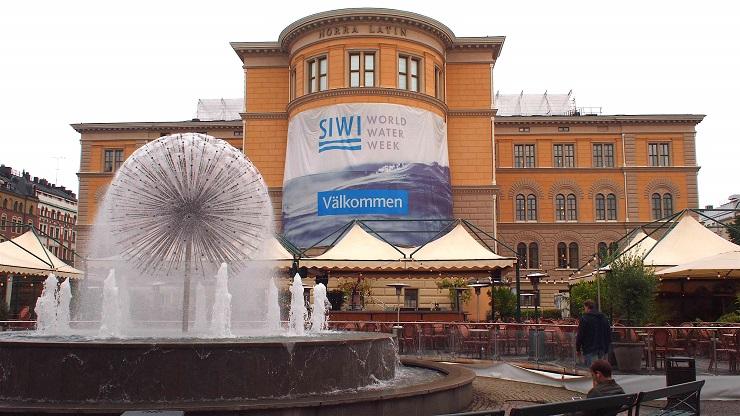ASIACALLING
Reusing water grows more food
"At this year’s International Water Week in Sweden, international experts focused on how water can be reused so that the planet can support a growing population."

For millions of people, water scarcity is a way of life, and farmers are some of the hardest hit, without clean water to produce food.
Meanwhile, industry sucks up millions of gallons ofwater and spits it back out dirty and contamianted.
If that water was treated and managed properly, we could see a renaissance in food production, especially in Asia.
Reporter Ric Wasserman has this story from the world’s largest water forum, World Water Week, in Stockholm.
Without water, there is no life. It’s the earth’s most precious resource. But it’s often squandered, and it’s rarely recycled.
Sohail Al Nakvi is an engineer, and he grew up in Pakistan’s fertile Punjab region, or ”the land of the rivers.” He tells me he has watched as the area is sucked dry.
”Unfortunately with the passage of time those rivers are shrinking and squeezing because of the missmanagement of the water. There are two issues: one is the water quantity, the other is the water quality.”
At this year’s International Water Week in Sweden, international experts focused on how water can be reused so that the planet can support a growing population.
For now, crops use 70% of the world’s fresh water resources, but that’s not always clean water, it’s often reused water that has been contaminated by industry or excreta.
In Asia, up to 80% of waste water runs straight into rivers. It contains pathogens and chemicals. And they’re absorbed into food crops, livestock and fish, that people go on to eat.
”In fish species, in their bones there exist heavy metals which are coming to our foodchain,” Sohail explained. ”People don’t know it is also mixed with industrial hazardous waste which is an alarming situation in the rural communities.”
That contamination can lead to sickness, anything from diarrohea to long-term disabilities and death.
Farmers prefer wastewater, becase of its nutrients. They’re often unaware that it is dangerous, and that they’re putting consumers at risk.
But who is to blame for the pollution?
Water researcher Jenny Grönvall says the textile industry is one of the worst offenders, especially in India.
”The discharges from the textile industry is very heavy in contaminants, not least chemical compounds some of which are very toxic.”
Grönvall says there are solutions, that would allow farmers to grow food more safetly.
”So, we have good technology, good infrastructure, quite a lot of competence. But it needs to be used,” she commented.
The responsibility for treating wastewater lies squarely with industry, according to Grönvall.
I was curious to see what can be done to reduce and reuse waste water properly. Done right, farmers and consumers the world over would benefit.
![]()
So, I took a bus trip with a group of water experts, to a pharmecetuical factory, where around 10 billion tablets are produced each year. We took a look at their water treatment plant.
Waste water emission from this plant is 99.8 % free of pollutants – it is a state of the art facility.
Fungi, bacteria and active carbon are used to remove organic waste from water. Chemical separation removes harmful phosphorous and iron sulfate.
”We have a responsiblilty as a manufacturer of medicines and active pharmaceutical ingredients that we do not do any harm to the environment,” said Jacob Lund, communications director at the plant.
But the same company has pharmaceutical plants in 17 other countries. And Lund wouldn’t tell us what water treatment standards are like in those parts of the world.
It’s expensive to treat industrial wastewater, so companies often cut corners, or don’t bother.
But it must become a priority, says WHO’s Deputy Director for Land and Water, Olcay Unver. In spite of all the available technology, the best advice to save water, says Unver- stop eating red meat.
”To produce one kilo of red meat you use about ten tons of water, about 10,000 kilos of water.”
There’s only so much water in the world to go around. If it’s wasted, we’re doomed.
But if we protect fresh water, and use the technology that’s available to recycle waste water, we might just get a little closer to zero hunger.
- World Water Week Sweden
- Ric Wasserman
- water security
Komentar (0)
KBR percaya pembaca situs ini adalah orang-orang yang cerdas dan terpelajar. Karena itu mari kita gunakan kata-kata yang santun di dalam kolom komentar ini. Kalimat yang sopan, menjauhi prasangka SARA (suku, agama, ras dan antargolongan), pasti akan lebih didengar. Yuk, kita praktikkan!